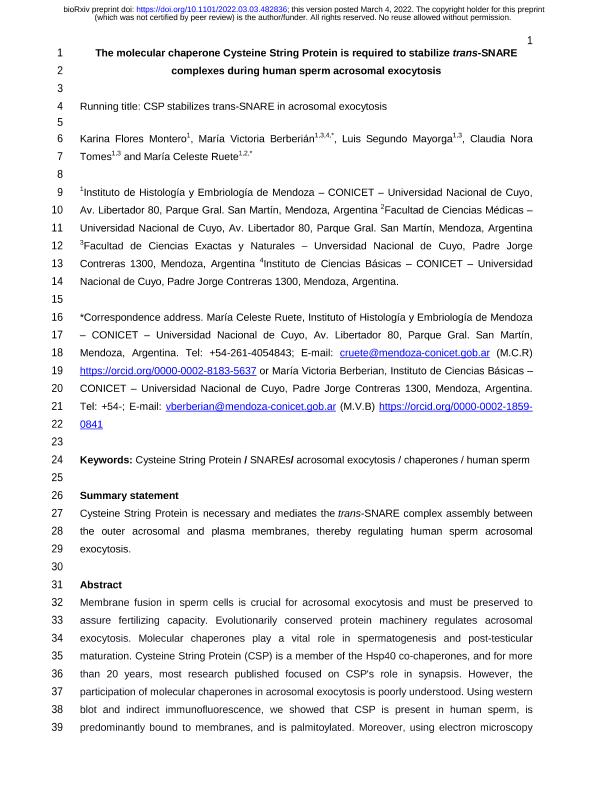Artículo
The molecular chaperone Cysteine String Protein is required to stabilize trans-SNARE complexes during human sperm acrosomal exocytosis
Flores Montero, Karina Johana ; Berberian, Victoria
; Berberian, Victoria ; Mayorga, Luis Segundo
; Mayorga, Luis Segundo ; Tomes, Claudia Nora
; Tomes, Claudia Nora ; Ruete, María Celeste
; Ruete, María Celeste
 ; Berberian, Victoria
; Berberian, Victoria ; Mayorga, Luis Segundo
; Mayorga, Luis Segundo ; Tomes, Claudia Nora
; Tomes, Claudia Nora ; Ruete, María Celeste
; Ruete, María Celeste
Fecha de publicación:
03/2022
Editorial:
Cold Spring Harbor Laboratory
Revista:
bioRxiv
ISSN:
2692-8205
Idioma:
Inglés
Tipo de recurso:
Artículo publicado
Clasificación temática:
Resumen
Membrane fusion in sperm cells is crucial for acrosomal exocytosis and must be preserved to assure fertilizing capacity. Evolutionarily conserved protein machinery regulates acrosomal exocytosis. Molecular chaperones play a vital role in spermatogenesis and post-testicular maturation. Cysteine String Protein (CSP) is a member of the Hsp40 co-chaperones, and for more than 20 years, most research published focused on CSP´s role in synapsis. However, the participation of molecular chaperones in acrosomal exocytosis is poorly understood. Using western blot and indirect immunofluorescence, we showed that CSP is present in human sperm, is predominantly bound to membranes, and is palmitoylated. Moreover, using electron microscopy and functional assays, we reported that sequestration of CSP avoided the assembly of trans-complexes and inhibited exocytosis. In summary, our data demonstrated that CSP is necessary and mediates the trans-SNARE complex assembly between the outer acrosomal and plasma membranes, thereby regulating human sperm acrosomal exocytosis. Understanding CSP´s role is critical in identifying new biomarkers and generating new rational-based approaches to treating male infertility.
Palabras clave:
CSP PROTEIN
,
ACROSOMAL EXOCYTOSIS
,
SPERM
,
CHAPERONE
Archivos asociados
Licencia
Identificadores
Colecciones
Articulos(ICB)
Articulos de INSTITUTO INTERDISCIPLINARIO DE CIENCIAS BASICAS
Articulos de INSTITUTO INTERDISCIPLINARIO DE CIENCIAS BASICAS
Articulos(IHEM)
Articulos de INST. HISTOLOGIA Y EMBRIOLOGIA DE MEND DR.M.BURGOS
Articulos de INST. HISTOLOGIA Y EMBRIOLOGIA DE MEND DR.M.BURGOS
Citación
Flores Montero, Karina Johana; Berberian, Victoria; Mayorga, Luis Segundo; Tomes, Claudia Nora; Ruete, María Celeste; The molecular chaperone Cysteine String Protein is required to stabilize trans-SNARE complexes during human sperm acrosomal exocytosis; Cold Spring Harbor Laboratory; bioRxiv; 2022; 3-2022; 1-25
Compartir
Altmétricas



